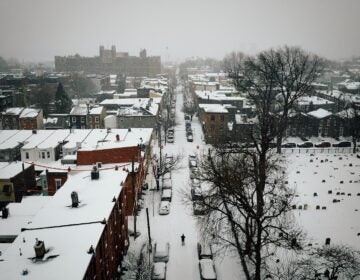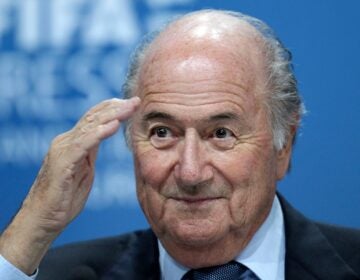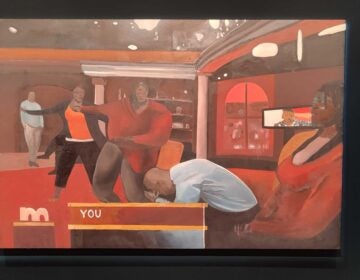Thousands march to ‘ReclaimMLK’ in Philly
Listen
Protesters rounding Philadelphia City Hall before heading up Market Street (Tom MacDonald/WHYY)
The few thousand people who marched through Center City on Monday to pay tribute to Martin Luther King advanced the momentum of Ferguson-related protests by agitating to “reclaim” the holiday.
Traditionally in Philadelphia, MLK Day is considered a day of service — be it feeding the homeless, remodeling a community center or registering voters.
But in more than a dozens cities from Oakland, California to Boston, protesters staged marches rallying around issues of racial justice.
In Philadelphia, rally organizers said the idea was born from the Black Lives Matter movement, coming in the wake of the deaths of unarmed black men at the hands of police that triggered national outrage.
Their message was threefold: boost funding for and radically reform public schools; bolster the city’s minimum wage to $15 an hour; and end the police tactic of “stop and frisk,” the practice of sporadically investigating residents for suspicious behavior.
Many of Monday’s attendees were like David Robinson, an unseasoned protester who just feels fed up.
“Nothing has changed,” Robinson said. “There’s this pretense that we’re in this post-racial era. But that’s an absolute lie. We all know that.”
That belief was highlighted by the myriad community leaders and student activists who spoke before the march, which kicked off outside the Philadelphia School District headquarters on North Broad Street.
For Philadelphia resident Ruth Birchett, marching was her third event of the day. She began with a community cleanup event.
“But I’m here to stress the importance of safety, and the issue of police maltreatment of citizens. We have a difficult ways to go here in this country, and particularly in this city, with the way that police treat blacks … it’s a huge issue and it’s one that I’m glad that finally risen to the surface,” she said.
Professor David Farber teaches courses on social movements at Temple University. He says if the Black Lives Matter movement results in, for example, equipping more police officers with body cameras, then that’s a small victory. But if the protests are able to advocate for larger policy that changes the lives of African-Americans, then that would be historic.
“It’s harder to organize, though, around those big issues. It’s harder to turn street heat into changes in law,” Farber said.
He said in the aftermath of Ferguson, there’s a lot of frustration and anger that’s sparking a multi-faceted response. “And it’s hard to separate what’s sometimes attention-seeking behavior from what’s really a committed, long-term struggle,” he said.
It’s important not to forget, Farber said, that the legal changes ushered in by the Civil Rights movement came about through a messy, complicated process.
“We still have this myth about the Civil Right movement: that there were like 10 logical steps that occurred and it led to productively to changes in law,” he said. “It was a wild time, and there were thousands of different groups trying dozens of different tactics to try to make change.”
“We’re in that whirlwind period now. It will be interesting to see which tactics are useful, which are long-standing and which are counterproductive,” Farber said.
Should street demonstration, rather than service projects, be the focus of every Martin Luther King Day? A debate has been simmering about the most genuine way to observe the holiday. Some activists have written that taking part in service projects on the day, as many have done for two decades, “defangs” King’s legacy.
Danielle Belton, in a story on the website the Root, characterized the day of service as “a generic mishmash of good feelings that contorts King’s social-justice legacy into a blissful Hallmark card of post-racial nothingness.”
Todd Bernstein, the founder of the Greater Philadelphia King Day of Service group, says that’s nonsense. He says more than 130,000 volunteers across the Philadelphia area participated this year, including celebrating the 1965 Voting Rights Act by registering people to vote and helping with voter education.
He says doing service work and protesting are in fact complimentary in that both are celebrating King’s legacy.
“Marching in the street for social justice is terribly important,” Bernstein said. “I think that Dr. King was not a one-dimensional person. To suggest that these are mutually exclusive is unfortunate.”
To prove his point, Bernstein joined the thousands of marchers.
He’s already making plans for next year’s day of service. Whether the marchers will return in 2016 as well is unclear.
WHYY is your source for fact-based, in-depth journalism and information. As a nonprofit organization, we rely on financial support from readers like you. Please give today.




